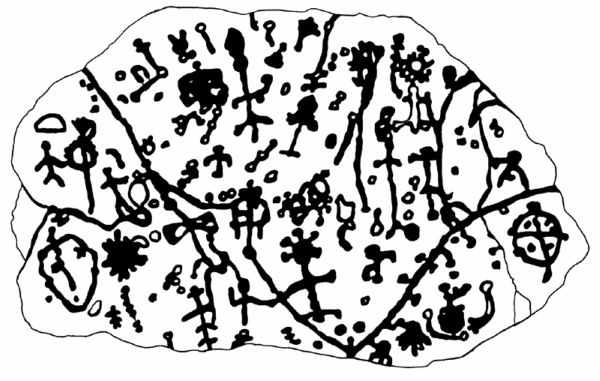

Judaculla—or Jutaculla— Rock is one of the greatest archaeological mysteries in the United States. The largest petroglyph in North Carolina, and one of the largest in the Southeast, is named for a Cherokee legend about its formation. Judaculla Rock sits in the Caney Fork Creek valley in Jackson County, outside of Cullowhee. The details of the petroglyph’s formation, as well as its origin and purpose, are unknown to scientists.
The soapstone slab is about sixteen feet long by eleven feet wide. The designs on it appear to have been produced in a variety of manners, including incising, pecking, and smoothing. These methods are evident upon close examination, but are becoming more difficult to identify with the continued erosion of the rock.
In the late 19th century, Cherokee groups were known to hold ceremonial assemblies around the rock. Additional outcrops of soapstone, used by Cherokees then to sculpt pipes, beads, bowls, and bannerstones, are located near the Judaculla Rock. Archaeologists think the Cherokees camped at, or near, the rock when they came to quarry soapstone. Furthermore, due to recent excavations of the areas surrounding Judaculla, scientists now postulate that the rock was part of a larger grouping of soapstone creations.
James Mooney, a researcher at the Smithsonian Institution, recorded the Cherokee legend of Judaculla Rock in the 1880s. According to Mooney’s story, a being named Judaculla (called by the Cherokee Tsul-ka-lu or Tsu’ Kalu— the Great Slant-eyed Giant) was the greatest of all the Cherokee mythical characters, a giant hunter who lived on the southwestern slope of Richland Balsam Mountain at the head of the Tuckaseegee River in Jackson County.
Judaculla was very powerful and could control the wind, rain, thunder, and lightning. He was known to drink whole streams down in a single gulp and stomp from mountain to mountain as one might over ant hills. (In fact, according to Sequoyah’s Cherokee translation of the Bible, the word ‘Goliath’ was renamed Judaculla.) Written by David Tabler
Cherokee Legend -- In the beginning of this world when life was new, all manner of new creatures came into this world. There was awi the deer, yvna the bear, tsista the rabbit, gi:hlithe dog, suli the buzzard, and many others. Last of the creatures born was a strange new animal called man.
In those days every living thing could communicate with one another because they spoke a common language. People could talk to animals or the water, the plants, the fire or the stones. All beings respected and understood each other and took only what each needed to live. But gradually within man something began to change.
People forgot they were a part of one Great Life. They neglected to maintain a harmonious way of being (duyukta) they would take more than they needed and showed disrespect for other creatures. Instead of taking one deer, they would kill an entire herd, taking only the choice meat and leaving the rest to rot. They poisoned whole pools of fish instead of catching a few. They trampled insects and other small creatures through dislike or carelessness.
As people continued to separate themselves from the rest of the Great Life and disregard the Laws of Nature, they forgot how to speak the original language.
When the animal nations came together in council, they would ask "What do we do about the problem of man?" The bear nation held a council and the Great White Bear asked his people this question. Their answer was to declare war on man.
To give themselves a chance against the more numerous and aggressive man, they decided to make themselves a bow and arrow. When it was made, one of the warrior bears drew back the bow and fired. The arrow flew wildly, landing nowhere near the target. The bear offered to chop off his claws so he could be a better bowman, but the Great White Bear stopped him, reminding the bears that the Great Life had provided the bears with their claws and teeth to feed and defend themselves. If they tried to change what they were, then they became no better than man.
Hearing this, all the bears agreed and the council disbanded. Over the years, other animal nations held their councils but they, too, could come to no conclusion what to do about the problem of man.
Finally, the creeping, crawling nation--the insects--held a council and they decided to give man disease. As they shouted out the name of each disease--liver disease, heart disease, pain in the joints, fever--these illnesses came into the world. Every man, woman and child was afflicted, and many died, but a few began to recover.
So, in order to rid themselves of man completely, the chief of the insects, the White Grubworm went to the chief of the Green People, Grandfather Ginseng (yvwi usdi). He asked Grandfather Ginseng to help the insects totally destroy mankind.
The plants are a patient people and the ginseng plant asked for four days to pray and think about the decision. After four days Grandfather Ginseng said, "We have heard your words and there is much truth in them. People have hurt and abused us as much or more than they have you.
But, we also understand that man is still young and foolish, and we are all part of the same Great Life. So we have decided that if people come to us in a good way, a sacred way, we will help them by giving them the cure for every disease which you, the insects, have made.
This is a promise made to us by the Green People and to this day they honor their pledge by providing us with food and medicine. It is still a common practice among Cherokee herbalists to walk through the woods allowing the needed medicine to announce itself by unusual shaking or other obvious signs.

